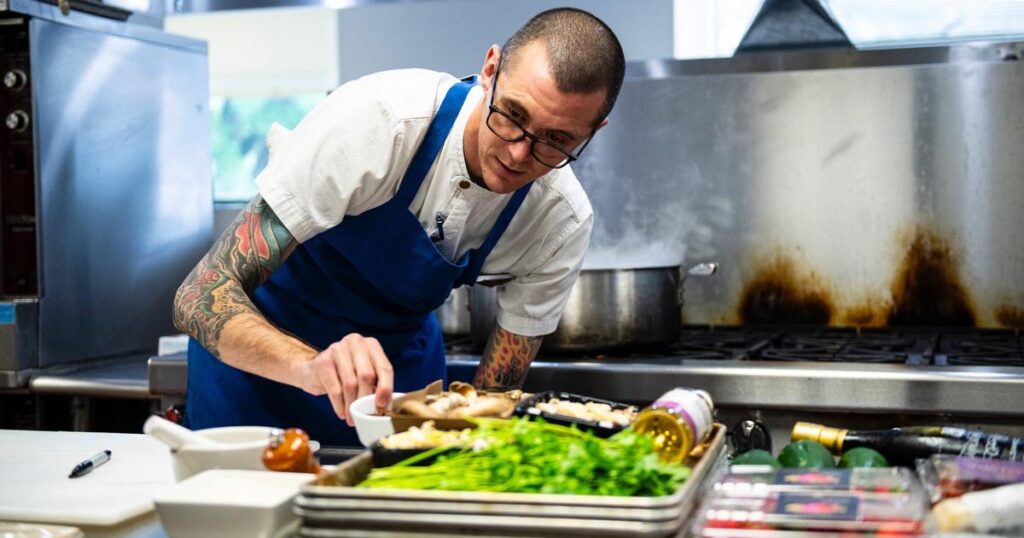Video produced by UK Public Relations and Strategic Communication and Marketing and Brand Strategy. To view captions for this video, push play and click on the CC icon in the bottom right-hand corner of the screen. If using a mobile device, click on the “thought bubble” in the same area.
LEXINGTON, Ky. (May 24, 2024) — The International Society of Neurogastronomy (ISN) held its annual symposium at the University of Kentucky’s Gatton Student Center on May 18. The event brought together an interdisciplinary group of chefs, neuroscientists, agricultural scientists and health care professionals to explore how the brain creates and processes flavor sensations, and how this knowledge can promote healthier diets.
Sponsored by the National Institutes of Health/National Institute on Deafness and Other Communication Disorders and UK HealthCare, the symposium highlighted the significant role the University of Kentucky plays within ISN. Five UK representatives serve as officers, including current ISN president Timothy McClintock, Ph.D., a professor of physiology, and past president Dan Han, Psy.D., a neuropsychologist.
The concept of neurogastronomy covers a wide array of disciplines relevant to eating habits, flavor preferences and consumption behaviors. The mission of ISN is to advance neurogastronomy as a craft, science and health profession, enhance the quality of human life, and generate and disseminate knowledge about brain-behavior relationships in the context of gastronomy. “It is important to understand the roles of smell and taste in daily life and the problems that arise from deficits in these senses,” said McClintock. “Nearly 25% of adults have reduced ability to smell, taste or both.”
The symposium featured several key presentations, including:
Celebrity chef Fred Morin and UK Athletics dietitian Monica Fowler discussed nutrition and caloric intake needs for young athletes.
Valerie Duffy and Ginnefer Cox addressed flavor preservation in low-salt diets for people living with hypertension.
Robert Pellegrino provided insights into cooking for people with smell or taste deficits caused by factors like chemotherapy, head injury or infection.
“Attendees always seem to greatly enjoy the panel discussions, even more this year than most. They certainly peppered UK Athletics dietitian Monica Fowler and celebrity chef Fred Morin with questions about cooking and nutrition for young athletes,” said McClintock. This flowed into lively discussions with the other presenters that followed. Those included Rachel Herz, a scientist and author known for her books and TED talks on neurogastronomy, and Katie Barratt, a wine expert from South Africa, who shared her methods for evaluating wine and food pairing of wines.
Organizers say this year’s symposium also brought discussions about how the increasingly common label “Food as Medicine” may be misleading and probably unhelpful in certain situations, while there still remains a need for public health policy for food security and global health. “Very rarely is food used in the same way that we use medical interventions. Instead, our experts recommend other labels, such as ‘Food for Health,’” said McClintock.
The ISN president says one of the rare exceptions where food is used therapeutically, such as the use of full ketogenic diets to treat children who have drug-resistant epilepsy or Glut1-deficiency. “For the public at large, we need to use healthy diets as a preventative measure. Our experts think the ‘health’ label will encourage people to think of their eating habits this way, and not to wait to eat a more healthy diet until they have developed a serious health problem,” said McClintock.
As part of the symposium, Chef Fred Morin and Chef Trevor Morones competed in the annual Gina Mullin Cooking Challenge. The tradition of the event is to feature the culinary skills of a few chefs as they prepare dishes with a set of certain dietary restrictions and then serve those dishes to a panel of judges impacted by the challenge at hand. This year’s challenge was to deliver flavorful and enjoyable dishes for those on low-sodium diets. Chef Morin won for main course, while Chef Morones won for appetizer and dessert.
The symposium also included the popular Neurogastronomy Dinner Workshop, where local Chef Ouita Michel and her staff showcased their culinary skills, allowing participants to experience and learn about flavor in a practical setting. Attendees at the dinner had the unique opportunity to hear from John McGann, who debunked the myth that humans have an inferior sense of smell.
Overall, the event was a rich blend of scientific presentations, practical demonstrations and interactive sessions, all aimed at promoting a broad understanding of how taste and smell affect food choices and health.
Next year’s ISN symposium will take place in Philadelphia, Pennsylvania.

